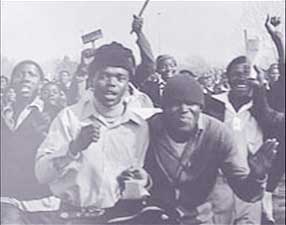30 years after Soweto Uprising
Heroism of South African youth saluted
Published Jun 20, 2006 10:29 PM
The
Soweto Uprising of June 16, 1976, was the culmination of six decades of struggle
for national liberation in South Africa. It marked the beginning of the end of
the apartheid regime, which had begun assuming the mantle of British colonialism
in 1948.
As the struggle in South Africa unfolded, it drew in
progressive forces throughout the world. Everyone who wanted to fight against
racism in their own country, or support the national liberation struggles in the
Mideast or Indochina, had to incorporate the struggle against apartheid in South
Africa and its spin-off in Zimbabwe.
The spark that set off the
students—being forced to learn in Afrikaans, that misnamed, minor-league
language used by the oppressors, who pretended to call themselves
Africans—was fueled by decades of brutal oppression and harsh
exploitation.
What happened in Soweto on June 16, 1976,was truly a
historic demonstration. What follows are selections from statements by the
African National Congress, the Youth Wing of the ANC and the South African
Communist Party, presenting what they feel are the lessons of the Soweto
Uprising.
—G. Dunkel
Selection from ANC Youth
League Statement, issued June 14. Full statement at
www.anc.org.za/youth/
June 16, 1976: Epitome Of Youth
Struggles
The events that came to pass that fateful day and continued
for months thereafter, engulfing the country in flames, forever entrenched the
role of the youth as one of the motive forces of our revolution. It is therefore
no fallacy that South Africa’s youth earned their stripes in the
battlefield as brave foot soldiers who led the charge from the front.
As
we commemorate 30 years of the 1976 student uprisings that altered the political
landscape of our country forever, we must pay homage to all those who dedicated
their lives and service to the attainment of our liberation, and placed
themselves at harm’s way so we could all be free. It is the spirit of
their dedication to the struggle and their selfless commitment to the attainment
of its goals that must continue to inform our political program, as we seek to
advance and realize what they stood for.
Letter from President Thabo
Mbeki
Long live the memory of the June 16
martyrs!
Issued June 16. Full statement at
www.anc.org.za/ancdocs/anctoday/2006/at23.htm
Our
movement was 64 years old when the Soweto Uprising exploded in the dusty streets
of our townships, acting as a powerful force that took our struggle for national
liberation to even higher levels of militancy and intensity.
From
the very first day, our movement understood that the Uprising constituted a new
and critically important chapter in the struggle it had led for over six decades
already. It therefore welcomed the Uprising, saluted the young patriots who were
ready to die for freedom, and resolved to do everything to support the fighting
youth of our country, integrating them in the broad struggle for national
liberation.
From a 1986 speech by Joe Slovo, the
secretary general of the South African Communist Party, which outlines the
political and organizational context of the Uprising. Complete source available
at
www.sacp.org.za/index.php?option=com_content&task=view&id=1372&Itemid=67
July 30th, 1986
65TH Anniversary of the South
African Communist Party
When South African communists met in
Cape Town 65 years ago they planted the first seed in our continent of a class
party of the working people guided by Marxism-Leninism.
The
founding congress of the African National Congress had already taken place nine
years earlier. It brought into existence the first modern national liberation
movement in Africa. ...
Class exploitation and national
oppression-the two most salient and interdependent realities of South
Africa’s socio-economic structure-became the sources of two complementary
streams of revolutionary consciousness and revolutionary organization.
...
The 40th anniversary of the 1946 passive resistance campaign
and the 25th anniversary of the formation of Umkhonto we Sizwe in 1961 symbolize
both the divide and the continuity of the phase of militant mass non-armed
defiance and the inevitable evolvement of a strategy in which organized,
revolutionary violence became an essential ingredient of the political
struggle.
The 10th anniversary of the Soweto Uprising in 1976
reminds us of the emergence of organized youth-the young lions-as one of the
major social forces in the revolutionary line-up.
Articles copyright 1995-2012 Workers World.
Verbatim copying and distribution of this entire article is permitted in any medium without royalty provided this notice is preserved.
Workers World, 55 W. 17 St., NY, NY 10011
Email:
[email protected]
Subscribe
[email protected]
Support independent news
DONATE


